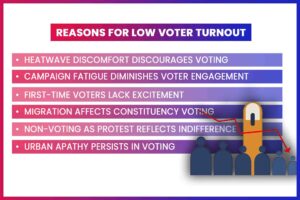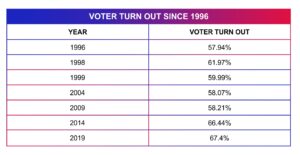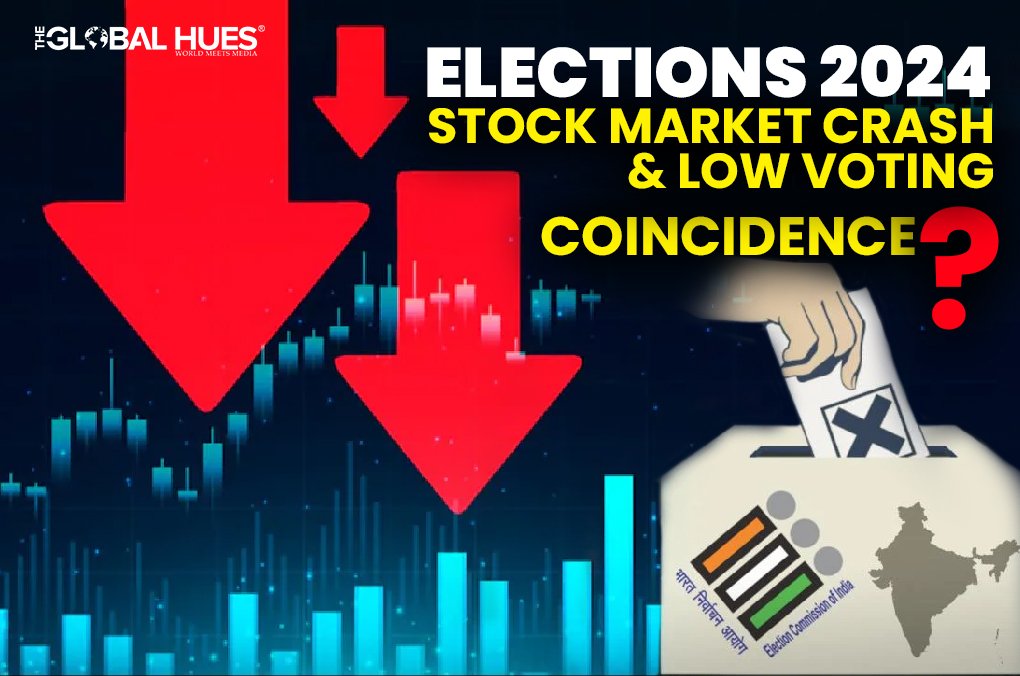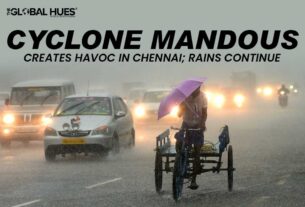Discover
-
Why did the stock market drop during the Lok Sabha elections?
-
What are the reasons behind low voter turnout in the General Elections?
-
Why does low voter turnout happen every year?
The stock market is going through a rough patch. The Sensex fell more than 1,000 points and Nifty fell almost 350 points on 09th May 2024. This recent news follows days of the stock market going down, while the Lok Sabha elections are happening. Are these two related?
Is it just a normal day at the stock market? Or an after-effect of the ongoing Lok Sabha elections.
Is there a connection between the two? Let’s find out.
Is there a connection between the stock market drop and low voter turnout?
The development happens at the same time as uncertainty about the elections is growing due to less-than-expected voter turnout. The speculations regarding the implications of voter turnout are the key driver of market sentiments.
Lok Sabha elections in 2019 saw a voter turnout of 67.40%, the highest ever in India’s history. It meant that roughly 61.5 crore voters cast their ballot out of 91. 2 crore who were eligible to vote. However, things aren’t the same in the 2024 General Elections.
This year, the first two phases of the vote were held on April 19 and April 26 in 190 constituencies, with a voter turnout of 66.1 per cent and 66.7 per cent respectively. In Phase 3, the turnout was 64.4 per cent.
The low voter turnout in the initial three stages of the ongoing elections has made the market feel uncertain. If the turnout stays low in the upcoming stages, it could affect both the election results and the stock market. So, it’s important to pay attention to what happens next.
According to SBI research, while the percentage of total registered voters casting their ballots had gone down, the overall number of people voting this election has gone up.
Low voter turnout may impact market stability, but there are other factors at play. Indian financial markets are navigating a landmine of domestic political uncertainties and global economic shifts. Subsequently, once the elections are over on June 4, the market’s focus will likely adjust based on emerging political and economic data.
What are the reasons for low voter turnout in the General Elections?

There can be many reasons for a low voter turnout during the General Elections. Below is a list of those reasons:
Impact of Heatwave
The scorching heat makes standing in long voting lines tough. Standing under the scorching sun for extended periods is physically exhausting and uncomfortable. This discourages people from voting.
Tired of Campaigning
Too much campaigning with arguments and promises has left people feeling tired and let down. As the campaigning stretches on, voters may start to feel fatigued and disillusioned by the constant barrage of information and rhetoric.
New Voters Not Excited
People who are voting for the first time aren’t as excited as they should be. Despite being a milestone moment in their civic participation, first-time voters may lack a deep understanding of the political landscape or feel disconnected from the issues being discussed.
Migration
After the pandemic, getting employed has been difficult. Many people move to different places for work or a better life. Moreover, it also means that they wouldn’t find it inconvenient to vote in their home constituency.
Protesting by Not Voting
Many voters don’t vote as they want to show not voting as a form of protest against corrupt politicians. However, this doesn’t really change anything and just shows their indifference.
Urban Apathy
Every year, new lists are created for people who are eligible to vote. However, despite an increase in the number of voters, many people in urban areas, especially young voters and migrants, still don’t vote. This is particularly true in capital cities and urban centres. Moreover, many voters neither care about the electoral process nor about the issues at hand.
These are some of the reasons for low voter turnout. But is it the problem for this year only? No, low voter turnout is not a problem for the year 2024. Let’s see how.
Also Read: Who Will Lead India? What’s at Stake for Businesses?
Why does low voter turnout happen every year?
The Election Commission of India reports that the first national election in India, held from October 1951 to February 1952, had a voter turnout of 45.67%. Since then, voter participation has risen, but it hasn’t surpassed 70% yet. Moreover, the highest voter turnout was recorded in the 2019 elections. The voter turnout percentage was 67.4 per cent.
Here is a table representing the voter turnout since the year 1996:

The final voter turnout could surge as there are some states where elections are still pending like Delhi. Whether it would surpass the turnout in 2019, is yet to be seen. For instance, Uttar Pradesh’s Ghaziabad logged a 55.88 per cent turnout in 2019. It reported 49.88 per cent in 2024. Sahibabad assembly saw the highest drop, recording a turnout of 42.8%, 6.7% points lower than 2019 (49.5%).
According to the reports, India’s voter turnout reached a record high in 2019. However, 30 crore electors did not cast their ballots, including a big chunk of migrant workers. Moreover, turnout was especially, lower in states with larger immigration rates and populations in the last general elections.
Each Vote Counts. Here’s Why!
Elections are an essential time as they allow people to choose the perfect candidate to head the country and their constituencies. Below are a few reasons, which showcase the importance of voting:
Voting Matters for Representation
Being a democratic nation, we have the right to choose our representatives. By voting, we choose leaders who will speak up for our needs in government. By voting regularly, we pick leaders they think will help improve their lives.
Voting Promotes Accountability
When we make any decision ourselves, we become accountable for them. Likewise, when we vote, leaders become answerable for what they do. If they don’t keep their promises or serve people well, they can be voted out. This keeps the government honest and transparent.
Equal Voices, Equal Votes
Equality is our fundamental right. The age for voting is 18 years. So, it means everyone, no matter who they are, has the same chance to take part in democracy. Each vote counts equally, giving everyone a fair say in decisions.
Voting Shapes Social Change
Voting is important so that we choose the correct people to make our society fairer and better. Moreover, by picking leaders who want positive changes, voters can work toward a more equal and inclusive community.
Voting Maintains Stability
In a democracy, elections happen peacefully, which keeps the government stable. When we vote, it helps keep the government working smoothly.
Frequently Asked Questions
What is the full form of Vvpat?
The full form of Vvpat is the Voter Verifiable Paper Audit Trail.
When were EVMs first used in India?
The EVMs were first used in 1982 in the by-election to the Paravur assembly constituency in Kerala in a limited number of polling stations.
Who makes EVM in India?
EVMs/VVPATs are not imported but indigenously designed and manufactured by two Public Sector Undertakings (PSUs) namely Bharat Electronics Limited (BEL), under the Ministry of Defence and Electronics Corporation of India Limited (ECIL), under the Department of Atomic Energy under the guidance of the Technical Experts.
Who was the first chief election commissioner of India?
Sukumar Sen was an Indian civil servant who was the first chief election commissioner of India. He served from 21 March 1950 to 19 December 1958.
Which party symbol is the elephant?
Bahujan Samaj Party’s symbol is the elephant.
What is the party symbol?
The Election Commission of India gives each political party a special symbol that represents their ideas and where they stand. A symbol assigned to the national party cannot be given to other parties in the country.




